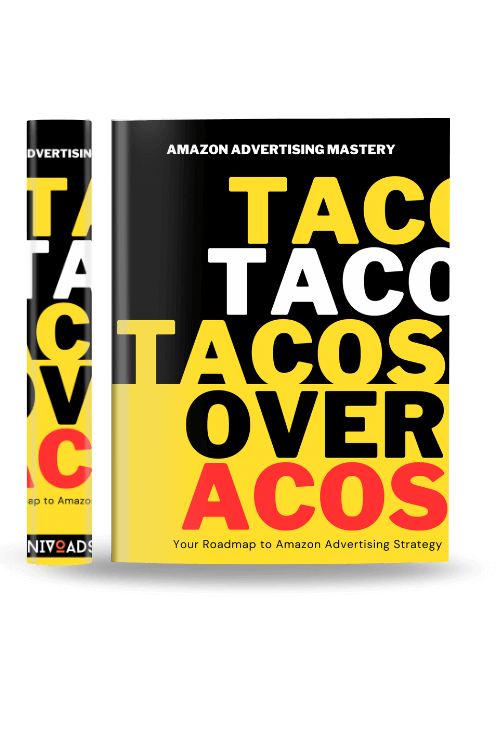ACoS & TACoS Calculation Simplified
Our Amazon TACoS & ACoS Calculator is here to help you determine your ad-spend efficiency, organic revenue, and make data-driven, and strategic decisions to drive more topline revenue, and profitability.
Total ACoS (TACoS)
-%
How To Calculate Your Amazon TACoS?
The Amazon TACoS formula is the following: (ad-spend ÷ total revenue) * 100.
To do this on the calculator, follow the steps below.
1- Select a time frame on the ad-console (e.g June 1-29) and copy your ad-spend into the calculator.
2- Select the same time frame on Seller Central (Business Reports) or Vender Central (Retail Analytics > Sales) copy your ordered revenue into the calculator.
If you’re running any DSP adverts, make sure to add your DSP ad-spend to your search ad-spend before calculating your TACoS.
How Often Should You Calculate TACoS on Amazon?
For Amazon sellers, TACoS is best calculated daily, weekly, and monthly.
Also, setting a TACoS goal is a great initiative for brands that are looking to spend a certain amount based on historic revenue and profit margins.
Benefits of using this tacos calculator
Read through the benefits and use cases carefully below to better understand how TACoS work, and how you could use it to your advantage.
- Ad-spend Efficiency: Measure the effectiveness of your advertising campaigns with ease. Our TACoS calculator helps you measure your Total Advertising Cost of Sales (TACoS), giving you a clear picture of how much of your sales revenue is being spent on advertising. This crucial metric enables you to optimize your advertising spend and adjust budgets accordingly.
- Wasted Spend: Millions of dollars is wasted daily by Amazon sellers by simply not utilizing TACoS to their advantage. Countless accounts (both seller and vendor) are spending too much in contrast to their total revenue. By measuring TACoS, Amazon sellers can spend according to their profit margins, and specific goal.
- ROI & Opportunities: Just like wasted spend, many sellers are not spending enough to scale their brand on Amazon. TACoS too can help you maximize your return on investment (ROI) by increasing spend to low TACoS SKUs. Millions if not billions of products on Amazon can rank on the first page if only we allocate more spend towards such SKUs.
- Organic Sales (% & $): The calculator also includes the organic revenue in both dollar amounts and a percentage. This will help you identify how much revenue is coming from organic results, and not from ads. This is particularly crucial when adjusting budgets (more on that in the e-book).
- Product Phase: TACoS can help you identify what phase your product is in (more on this in the free e-book). Just like a fetal development, each product on Amazon is at certain stage, and high or low TACoS can mean differently depending on what phase your product is at. A product with thousands of reviews, and competitive price point is not the same with newly launched product with 0 reviews, and a high retail price.

TACos Over ACoS
Amazon Strategy Book
Gain access to innovative, actionable strategies that equip you to effectively advertise on Amazon and take your business to new heights.
No matter your level of experience, this book is your ultimate companion to master Amazon advertising, and success.
Learn & apply 8 figure Amazon advertising strategies today!
What’s the Ideal Amazon TACoS?
A good Amazon TACoS varies depending on the product category, business model, and growth stage. For most sellers, a TACoS between 5-15% is considered healthy, as it indicates a balanced relationship between ad spend and total sales.
A lower TACoS suggests strong organic sales, while a higher TACoS may be acceptable during product launches or aggressive growth phases. Monitoring TACoS helps sellers understand the long-term efficiency of their Amazon advertising strategy and ensure their campaigns contribute to sustainable profitability.
Profit margin: Our calculator does NOT take into account various expenses such as product costs, promotions, Amazon fees (referral, and FBA), shipping expenses, and other associated costs to your FBA business.
These are separate fees that vary for each product, and you must calculate them according to your actual data to get precise profit calculations.
ACoS Or TACoS formula
The primary distinction between TACoS and ACoS lies in the scope of sales they consider. TACoS encompasses all sales, both organic and from advertisements, whereas ACoS focuses exclusively on sales generated through ads. TACoS offers a more comprehensive metric that provides an overall view of your advertising expenditure, while ACoS is more specific, concentrating solely on the performance of your advertising campaigns.
When employing these metrics, TACoS allows you to assess the overall effectiveness of your advertising campaigns and identify areas where you may be overspending or underspending. If your TACoS is excessively high, it may be necessary to adjust your advertising budgets or optimize your campaigns to enhance their performance.
On the other hand, ACoS serves as a valuable tool for evaluating the performance of individual campaigns, ad groups, or keywords. By monitoring your ACoS, you can identify which specific campaigns are generating the most sales and determine whether any adjustments or pauses are needed.
Both TACoS and ACoS play significant roles in assessing advertising performance on Amazon, offering distinct perspectives for analyzing campaign effectiveness and guiding optimization strategies.
Bookmark this page, and use it regularly to calculate your Amazon TACoS and organic revenue.
